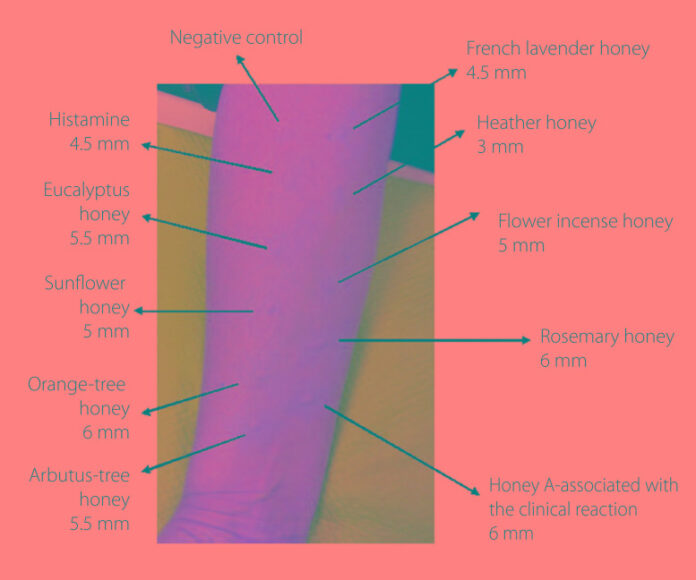Swollen lips, urticaria, and angioedema 10 minutes after ingesting honey- A case of a 40-year-old woman who was allergic to honey!
Honey is a complex mixture of flower nectars, sugars, proteins, and glandular secretions of bees. Honey has many beneficial effects, but can anyone be allergic to honey?
Yes! The main allergens involved in the honey allergy are pollen proteins (Compositae plants: ragweed, sagebrush) and proteins (enzymes) from the honeybee’s secretions. However, sensitization to other components of the bee’s body, fungal spores, algae, and other organic residues in honey have also been reported.
Case report of honey allergy:
A 40-year-old female presented to the outpatient department with complaints of suspected allergy to honey. At the age of 36 years, she had 2 episodes of generalized urticaria 20 minutes after consuming honey-containing foods, i.e., honey cake and banana with honey. Moreover, at the age of 37 years, she again had another episode of swollen lips within 5 minutes of ingesting traces of honey, followed by urticaria and angioedema within 10 minutes of honey ingestion.
Each time, the patient’s symptoms resolved with antihistamines and oral corticosteroids.
However, she had no history of atopy and neither reported hypersensitivity to Hymenoptera sting.
Moreover, she also reported prior ingestion and application of royal jelly for cosmetic purposes without any reaction.
Physical examination and routine laboratory investigations were normal at admission.
Skin prick tests (SPT) with a standard panel of extracts from aeroallergens and common allergenic foods were negative. Additionally, SPT and intradermic tests with bee venom extract were negative.
Prick-to-prick tests (PPT) using different types of honey including the one she consumed results were positive.
Thirty minutes after PPT, she developed generalized urticaria, lips-tongue-uvula swelling, and hypotension. Immediately, she received adrenaline and remained under surveillance for 24 hours.
Serum IgE was 98 kU/L, specific IgE to honey was 1.1 kUA/L.
The doctors educated her and counselled her to avoid honey. Moreover, they also educated him regarding the use of an adrenaline auto-injection kit.
Thereafter, the patient remained asymptomatic with complete avoidance of honey.
Although an allergic reaction to honey is a rare phenomenon, it is imperative to clearly label products containing even trace amounts of honey as honey is a cause of food-induced anaphylaxis and IgE-mediated hypersensitivity reactions.
Reference:
Aguiar R, Duarte FC, Mendes A, Bartolomé B, Barbosa MP. Anaphylaxis caused by honey: a case report. Asia Pac Allergy. 2017;7(1):48-50. doi:10.5415/apallergy.2017.7.1.48




